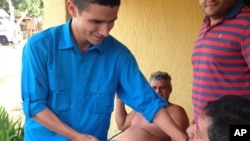Last year, Rafael Rico was covering his baby face with a vinegar-soaked rag and dodging tear gas canisters as he clashed with Venezuelan riot police.
This week, the 23-year-old engineering student is canvassing on the resort island of Margarita as he campaigns to represent the South American country's opposition coalition in upcoming legislative elections.
Rico is the youngest of a crop of new candidates who raged in the streets against Venezuela's socialist administration last spring, but now are putting their faith in the ballot box as the best way to force President Nicolas Maduro from power. More than a third of the candidates running in the opposition coalition's primary elections on Sunday are younger than 40.
“You have to protest, but you also have to vote,” Rico said, borrowing from his stump speech. “The repression and human rights violations that we saw in 2014 showed that just going into the streets without also winning elections doesn't give you the results you need.”
Last year's sometimes bloody demonstrations against the country's mounting economic chaos petered out after a government crackdown. But the problems young people protested, including severe shortages and the world's highest inflation, have only worsened amid a plunge in oil prices. Oil revenues fund almost all of Venezuela's government spending.
The country's opposition coalition, which holds a third of the legislature, now has a shot at dominating an election for the first time since the late President Hugo Chavez launched his socialist revolution 16 years ago. If the coalition wins, it's expected to use its legislative power to mount a recall referendum against Maduro.
Elections for the National Assembly are scheduled every five years and must be held by the year's end. The head of elections said last week that this year's contest will be in late November or early December. Polls show the opposition coalition would win if the vote were held today.
But positive polls don't guarantee an electoral victory. The opposition has mostly benefited from discontent with the ruling party, and has not won its advantage through its own campaigning, said Luis Vicente Leon, director of local pollster Datanalisis.
“The opposition's opportunity is potential energy, and its challenge is to make it kinetic energy,” Leon wrote in a newspaper column this week, warning that the coalition won't see results unless it works hard.
The opposition might have fielded many more young candidates if it hadn't decided to forgo primaries in most districts, a choice that upset emerging leaders like Rico who now must fight their way to the general election.
The coalition is made up of dozens often disagreeing parties, and insiders hand-picked 125 candidates from their own political cliques to run against the socialist party in the general election, leaving just 42 slots up for grabs for the 109 candidates competing in Sunday's primary.
It's another example of the discord that has hobbled the country's opposition for years.
“They could have said, `We're going to go to full primaries across the country, we want to bring in students who were fighting for democracy last year,' but they didn't do that,” said David Smilde, a senior fellow at the Washington Office on Latin America. “It's because they have a lot of politicians there who have a sense of entitlement. There are a couple dozen parties in the coalition, and they all have leaders and some want to be candidates.”
This year's opposition primaries are actually slightly more open than usual. In 2010, coalition leaders pre-selected candidates for all but 22 congressional seats. Just 10 percent of eligible voters cast their ballots in those primaries. Turnout this time is expected to be even lower because of a lack of publicity.
By contrast, the socialist party will hold primaries for nearly 100 seats this June, and has mandated that half of candidates be younger than 30, capitalizing on the power of the youth vote in a country where four out of 10 registered voters are younger than 35.
Opposition legislator Enrique Marquez said the opposition is too broke to hold more primary contests. The coalition already is asking each candidate to contribute 150,000 bolivars, about $500 at the widely used black market exchange rate, to cover election costs.
The opposition has also been battered by a steady government crackdown on its leaders and the closure or sale of combative media outlets. Some candidates in Sunday's primaries are still jailed on charges related to last year's protests, including Daniel Ceballos, the former mayor of the restive city of San Cristobal. In a quirk of Venezuelan law, a win could be a get-out-of-jail card for the 31-year-old politician because legislators receive immunity from prosecution during their terms.
Rico is working to persuade voters to turn out on Sunday, but like many in the opposition, he doubts the upcoming elections will be fair and fears Maduro will curtail the National Assembly's power if the ruling party loses its majority. If he can't achieve the change he wants through the ballot box, he knows what he'll do.
“We have to show our discontent in elections. And if they don't respect the vote, we'll be in the street again,” he said.




